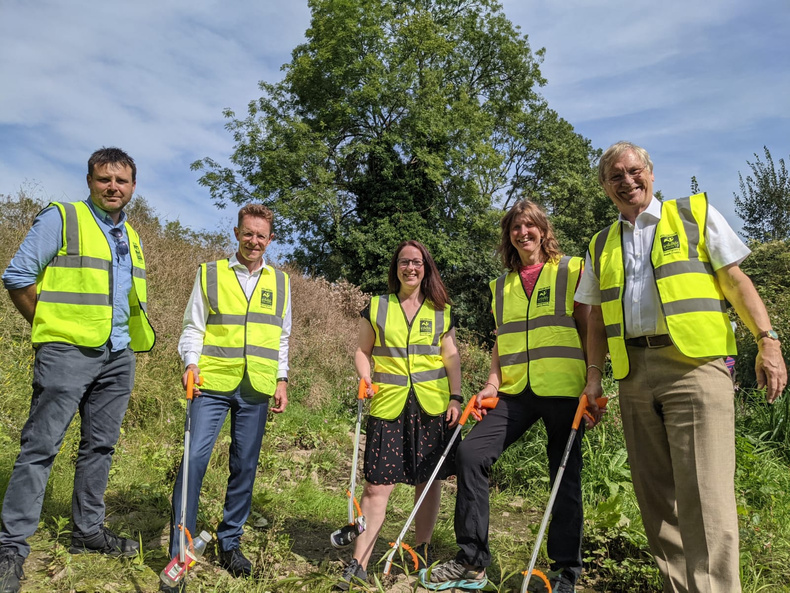Plan launches for region 's natural environment project

The first plan for the region 's natural environment has been officially launched on the banks of the River Stour.
The project, which has been awarded just under a quarter of a million pounds from the government as part of the West Midlands Combined Authority 's (WMCA) Natural Environment Plan, will help to transform the River Stour 's banks in Stourbridge and Wolverhampton into wildlife-rich areas and will create jobs and provide training for local people.
The Natural Environment Plan sets out the actions that the WMCA and its partners will take over the next five years to enhance the region 's biodiversity, protect endangered species, and improve access to green spaces and waterways for residents.
The plan is split into four themes of: access to greenspace; tree and hedgerow planting; wildlife corridors; and supporting financing to make these proposed changes happen.
The plan also highlights the benefits of nature for our health and wellbeing, recognising the impact of the Covid pandemic on urban areas with little access to greenspace.
The official launch was led by Andy Street, mayor of the West Midlands and chair of the WMCA, and councillor Ian Courts, WMCA portfolio lead for Environment and Energy and leader of Solihull Council.
Andy Street said: “During lockdown we all realised the importance of green spaces and how these areas, including our waterways, are key to our natural environment whilst also really benefitting our physical and mental wellbeing. That 's why we 've drawn up our Natural Environment Plan, which sets out how we 're going to improve and maintain these critical spaces across the West Midlands.
“The plan also recognises how the West Midlands ' natural environment holds huge potential to mitigate the effects of climate change, from reducing the risk of flooding to directly removing carbon dioxide from our atmosphere. Decades of polluting industry and expansive development on our greenbelt has forced wildlife out, but this plan aims to put a stop to the damage by protecting, restoring, and enhancing the region 's biodiversity for everyone 's benefit. ”
The West Midlands Natural Environment Plan follows this year 's #WM2041 Five Year Plan, which sets out how to keep the region on track for reaching net zero by 2041.
It aims to deliver a series of long-term outcomes, one of which is for everybody to have access to high quality greenspace within a 300-metre walk of their home.
The Plan aims to pave the way for the Government 's landmark Environment Bill and Nature Recovery Networks, expected to outline a series of targets on biodiversity and access to greenspace later this year. Jobs are also a key focus, with an ambition to support the creation of 200 jobs in natural capital by 2026.
The Plan is also underpinned by ongoing work to create a £750,000 programme of Community Green Grants, drive tree planting with our Virtual Forest initiative, and support the creation of a West Midlands National Park.
New major projects are outlined, such as establishing a new national walking trail, transforming the Digbeth viaduct into a public green walkway, securing funding for the Black Country UNESCO Geopark, and exploring setting up a regional tree nursery to increase the supply of native saplings.
The plan also sets out a commitment to explore how the region 's biodiversity can be improved across new transport infrastructure and other developments funded by the WMCA.
Councillor Ian Courts, WMCA portfolio lead for Environment and Energy and leader of Solihull Council said: “As our climate continues to change, our 'natural capital ' and nature-based solutions will be key to improving resilience, and through providing a means for us to adapt. Tree planting for example has an important role in providing better places, as well as being a natural flood mitigation measure.
“This first Natural Environment Plan for the region will seek to coordinate efforts across the West Midlands Combined Authority area. We will need to work with constituent and non-constituent authorities; business; communities and with environmental non-governmental organisations and third sector organisations.
“Our activities will celebrate the fantastic work that is already happening here in the West Midlands and find new opportunities for collaboration. I am excited about this Plan, but it is important that we work together towards shared outcomes that address both the climate as well as the ecological emergencies that we are facing. ”
Pictured: (Left to Right) Simon Atkinson, head of conservation at The Wildlife Trust for Birmingham and Black Country; Andy Street, Mayor of the West Midlands; Delia Garratt, chief executive at The Wildlife Trust for Birmingham and Black Country; Jacqueline Homan, head of environment at the WMCA; councillor Ian Courts, WMCA portfolio lead for environment and leader of Solihull Council
